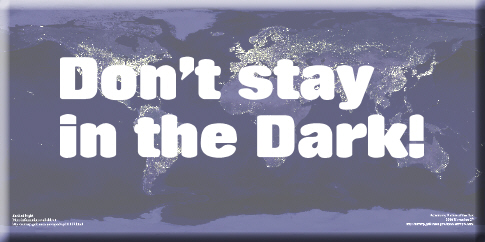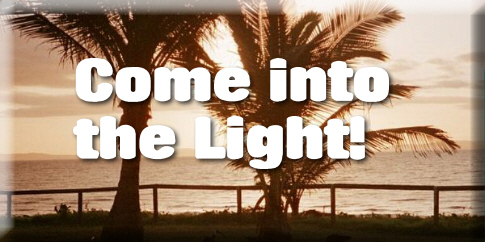

|
Reading: John 8.12;9.1-7,35-41 |
|
A couple of years ago the Brisbane Courier-Mail published a composite picture which NASA had produced from hundreds of satellite images of the earth by night. For anyone who has internet access and wants to look at it, it is on the NASA website. The accompanying explanation says |
|
This is what the Earth looks like at night. Can you find your favourite country or city? Surprisingly, city lights make this task quite possible. Human-made lights highlight particularly developed or populated areas of the Earth’s surface, including the seaboards of Europe, the eastern United States, and Japan. Many large cities are located near rivers or oceans so that they can exchange goods cheaply by boat. Particularly dark areas include the central parts of South America, Africa, Asia, and Australia. |
|
Of course, there’s nothing like a dark moonless night away from the town or city lights. The stars shine so brightly and clearly – are there are so many more of them visible. |
|
A few years ago we were camping with another family in the Girraween National Park near Stanthorpe. Their youngest son had one of those star charts with the stars marked on a clear plastic disk that could be rotated to give the southern sky for any time of the year. One night we took our blankets and lay on the grass identifying stars and constellations. |
|
The experts tell us that the retina at the back of the eye is made up of over a hundred million tiny cells. There are about seven million cone-shaped ones for seeing the world in daylight in all its colour. But there are some hundred million rod-shaped ones too for low-light night vision. Our night-time vision isn’t in colour, only black and white. When we switch off the light, it can take a while for our eyes to adjust. |
|
In the Dark |
|
Sometimes people tease us by not telling us the whole story about something. We complain, “Don’t keep me in the dark!” |
|
Being “in the dark” is the opposite of being “in the know”. “In the dark” we are ignorant, unable to respond properly to a situation or story. Our sense of fairness protests about being “left in the dark”. Others know what we don’t, putting us at a disadvantage. |
|
There are other problems about being “in the dark”. Our perception of reality can be very limited and centres on ourselves. |
|
A teacher in a school for blind children saw this as a major problem to overcome. Blind children find it difficult to have a concept of reality and community beyond themselves. |
|
Of course, we don’t have to be physically blind to have that problem. Politicians seem to prey on it all the time. No matter what we may say to the contrary, they know that most of us will judge their policies by how they impact on our budget. Is the trade deal with the US a good thing for Australia overall? All we see is that there’s nothing in it for cane-growers! How will the federal Budget affect us personally? The newspapers produce a set of tables to help us with just that. |
|
Sometimes we claim to have “high moral ground” and strong moral considerations. Then it turns out that we are most concerned whether existing policies – whether good or bad – can be used as a tool to help our preferred political party win the next election. |
|
We are in the dark! We have no reference-point of truth beyond ourselves. Our view of reality is both limited and false. Our partial truth is dangerous. |
|
The Light of the World |
|
Jesus made a startling claim – “I am the light of the world. Whoever follows me will never walk in darkness, but will have the light of life” (John 8.12). |
|
This claim cannot be ignored. It has been said that Jesus was either mad or bad – or he was speaking the truth. There are no other options available. |
|
I know that it isn’t “politically correct” to call the years “BC” and “AD” – abbreviations that are intended to remind us of the centrality of Jesus in human history. Time is now supposed to be “CE” (Common Era) and “BCE” (Before the Common Era). That prevents us discriminating against those of other religions or of no religion. But, disguise the fact as we will, Jesus is the giant of history. It is HIS-story. He is the Light of the world! |
|
Come into the Light |
|
Whatever people think of Jesus, there’s no doubt that he was a great figure of history. But, if he was the Light of the world… no, more than that, if it’s true that he is alive and is the Light of the world, then there is nothing more important for us than that we come into the light. |
|
Jesus had healed a man born blind. There was no quibbling about the miracle – everybody knew it had happened. The sticking-point for the religious establishment of the time was that it had happened on the Sabbath day, the day of rest. As the Pharisees probed the miracle, it became increasingly evident that the man had now come to a settled faith in Jesus and they expelled him from the synagogue. When he met Jesus face to face, his faith was confirmed and deepened. |
|
Then Jesus said, “For judgment I have come into this world, so that the blind will see and those who see will become blind” (Jn 9.39). |
|
The Pharisees who were listening sensed that Jesus was talking about them – “What? Are we blind too?” They really believed themselves to be “in the know”. They were the judges of right and wrong, good and evil. If Jesus was bringing people into the light, where did that leave them? |
|
Jesus said, “If you were blind, you would not be guilty of sin, but now that you claim you can see, your guilt remains” (v. 41). |
|
Jesus didn’t come into the world to exclude people, to “make some people blind”. He came with the offer of light for everyone. People like the Pharisees came under judgment because they refused the light of Jesus – “they loved darkness rather than light because their deeds were evil” (3.19). |
|
Don’t stay in the dark! No, it’s not a call for those we deem to be primitive, superstitious and ignorant to adopt our “advanced”, “superior” civilisation and lifestyle – and share our decadence, perhaps? |
|
Don’t stay in the dark! It’s a call to all us “Westerners” to come into the light of Jesus! For he is still inviting us, calling us, “I am the light of the world. Whoever follows me will never walk in darkness, but will have the light of life”. It’s a call every one of us needs to hear and heed. Don’t stay in the dark! |
|
Prayer: Lord Jesus, I’ve been in the dark… thought I could do it all on my own… believed I was clever enough to make it without any help – without you! But it’s true – I don’t like to admit it, but I’m a sinner… exposed by your light, shown up for what I am! Jesus, you died for my sins and you came alive again! I choose to come out of the dark and into your light, to accept your forgiveness and to live with you and for you from this day onward. Thank you, Jesus! Amen!

© Peter J. Blackburn, Home Hill and Ayr Uniting Churches, Guest Service, 13 June 2004 |
|
Except where otherwise noted, Scripture quotations are from the New International Version, © International Bible Society, 1984. |